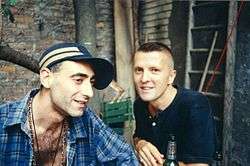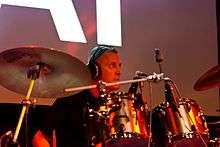Deutsch Amerikanische Freundschaft
| D.A.F. | |
|---|---|
 D.A.F. (Delgado-López left, Görl right) | |
| Background information | |
| Origin | Düsseldorf, West Germany |
| Genres | Electropunk, NDW, EBM, industrial, minimalism |
| Years active | 1978–present |
| Labels |
Mute Records Virgin Records |
| Associated acts |
DAF/DOS DAF.Partei |
| Members |
Gabriel "Gabi" Delgado-López Robert Görl |
| Past members |
Kurt "Pyrolator" Dahlke Michael Kemner Wolfgang Spelmans Christian Ludwig "Chrislo" Haas |
| Notable instruments | |
| Korg MS-20 | |


Deutsch Amerikanische Freundschaft (German pronunciation: [ˈdɔʏtʃ ameʁiˈkaːnɪʃə ˈfʁɔʏntʃaft]) or D.A.F. is an influential German electropunk/Neue Deutsche Welle band from Düsseldorf, formed in 1978 featuring Gabriel "Gabi" Delgado-López (vocals), Robert Görl (drums, percussion, electronic instruments), Kurt "Pyrolator" Dahlke (electronic instruments), Michael Kemner (bass-guitar) and Wolfgang Spelmans (guitar). Kurt Dahlke was replaced by Chrislo Haas (electronic instruments, bass guitar, saxophone) in 1979. Since 1981, the band has consisted of Delgado-López and Görl.
D.A.F.'s most famous songs are "Kebab-Träume" and, from the album Alles ist gut, the grimly sarcastic "Der Mussolini", a pulsing dance song. The lyrics "Dance the Mussolini, move your behind, clap your hands, and now the Adolf Hitler, and now the Jesus Christ, and now the Communism", caused a scandal.
In interviews they claimed to not target anything or anyone specific while creating lyrics to be taken as a parody of words and phrases floating around in the public media. "Sato-Sato" and "Der Mussolini" are both examples of songs written around Delgado-López's fascination with the sound of a particular word. A few months before the 2003 invasion of Iraq D.A.F. released "The Sheriff (An Anti-American Song)".
The album Alles ist gut (Everything is fine) received the German "Schallplattenpreis" award by the "Deutsche Phono-Akademie", an association of the German recording industry.
Style
Görl described their sound on Alles is gut in Melody Maker in 1981:[1]
- Most bands get a synthesizer and their first idea is to tune it! They want a clean normal sound. They don’t work with the power you get from a synthesizer ... We want to bring together this high technique with body power so you have the past time mixed with the future.
Delgado described his new vocal style in the same interview:
- The singing isn’t like rock ’n’ roll or pop singing. It’s sometimes like in a Hitler speech, not a Nazi thing, but it’s in the German character, that crack! crack! crack! way of speaking.
The band determined early on that they would not sing in English. As Delgado later said:[2]
- It’s not only a part of image. It’s a serious matter because DAF from the very first beginning didn’t want to imitate any American pop, rock or whatever. In fact we think there is a very strong American influence in culture, television, music, everywhere. So in the very first beginning one of our main content was to refuse to imitate rock ‘n’ roll, to refuse to sing in English. We don’t do that. We have our own identity. Our identity is not American identity.
As a lyricist, Delgado's concerns throughout D.A.F.'s recording career have ranged from sardonic reflections on ideology and political violence, to journeys into a very physical, even brutal, sexuality, sometimes related from a child's point of view. Having grown up as the child of working class Spanish immigrants in Wuppertal, and coming of age in the politically polarized era of the German Autumn (his response the left wing extremism of that time being thematized in the 2003 song "Kinderzimmer (Heldenlied)" ["Childhood Bedroom (Hero Song)"], he was blunt and unromantically detached about social reality in West Germany, and unapologetic about the provocative potential of his songs.
As performers and media personalities D.A.F. were, much like New York's Suicide, forerunners of later 1980s synthpop duos, such as the Pet Shop Boys and Soft Cell, in that the singer (in this case Delgado) appears relatively extroverted while the one who plays with the electronics (Görl) appears quiet and reserved. Visually, at least from Alles ist gut until 1st Step to Heaven, they cultivated a homoerotic image of black leather, muscles, hairy chests, and sweat. Gabi's hairy chest made a comeback appearance in the 2003 promotional video for "Der Sheriff", a song about the George W. Bush administration.
History
Formation and early albums
Görl came to Düsseldorf in August 1978 and met Delgado as both were regulars at punk club Ratinger Hof. Görl noted, "The earliest line up of DAF was Gabi and me in the basement of the Ratinger Hof. We created our basic ideas and we had a very strong will as a duo. Gabi Delgado played the stylophone and I played the drums." Several early Neue Deutsche Welle bands formed from this social group, and Görl and Delgado played with multiple other bands.[3] The first two D.A.F. albums featured the original four-piece line-up and a range of styles. Their first album, Ein Produkt der Deutsch-Amerikanischen Freundschaft, was released in 1979 on Dahlke's Ata Tak label (then called Warning). The album was 22 improvised untitled instrumentals, Delgado having temporarily left the band at the time.
The band then moved to London. As Delgado later noted, "at that time if you wanted to do new music you’d go to London because that was the center, not Düsseldorf."[2] Daniel Miller signed DAF to Mute Records because "they weren’t relying on past rock traditions at all, which is the criterion of what goes on Mute."[4] DAF recorded Die Kleinen und die Bösen (The Small Ones and the Evil Ones) for Mute, one side studio and most of the other side live. Some songs featured thrashed guitars, electronic screeching, and hammered drums while Gabi screamed and ululated. The record was widely lauded by the British music press, and earned the group an early cult following in the UK.
Virgin trilogy
DAF then shrank to just Delgado and Görl, who signed to Virgin Records and released Alles Ist Gut, their breakthrough album. The band became pop stars in Germany and gained great critical acclaim in the UK.
Görl played drums — usually fairly simple and relatively unsyncopated patterns, but with simple variations that prevented them sounding robotic — while Delgado sang. The only other instruments used were Korg MS-20 and ARP Odyssey analogue synthesizers usually driven by a Korg SQ-10 analog sequencer. Typically only a single sequencer-driven line would be used for a song, the sequence functioning both as melodic accompaniment and as a bassline. The song "Der Mussolini" is a perfect example of this. On other songs, such as the title track, certain notes of the sequence were set slightly out of tune. Overall the songs entail a complex tension between the predominantly visceral (the voice), the relentlessly robotic (the 16-step sequences), and the drums, which lie somewhere in between. One song, Der Räuber und der Prinz (The Robber and the Prince), also features a Glockenspiel-like sound as a sinister reminder of childhood.
Alles Ist Gut sold hundreds of thousands in Germany, and DAF became the fifth-biggest German-speaking group in Germany.[4]
The next two albums, Gold und Liebe (Gold and Love) and Für Immer (Forever), continued in the same vein, until, as one British music journalist of the time put it, D.A.F. had exhausted all the possibilities of the 16-step sequencer. These possibilities ranged from something resembling rhythm and blues — you could just about play Der Mussolini as R'n'B if you wanted — to the microtonality of Im Dschungel der Liebe (In the Jungle of Love) (on Für immer) or Knochen auf Knochen (the B-side of the single "Sex unter Wasser"). These three albums (from Alles ist gut to Für immer) were all produced by Konrad "Conny" Plank, who was renowned for his pioneering work both with minimalist-influenced Krautrock bands and other experimenters in the 1970s, and with electro-pop artists in the 1980s. The band added an Oberheim OB-Xa for Für immer.
The band split during the recording of Für immer.
Post-split
Each member released solo albums: Delgado Mistress (on Virgin), and Görl Night Full Of Tension (on Mute).
Delgado and Görl reunited in 1985 to record 1st Step to Heaven, their only album in English, which achieved one week in the Swedish album chart at no. 46.[5] Delgado later noted: "So we wanted to break our own rules and said: OK, so now we sing in English, now we don’t wear black. (laughing) With purpose. Because we wanted to break our own rules."[2]
During this extensive period their historical importance began to become clearer. Legendary radio DJ John Peel went as far as to call them the Grandfathers of Techno. Both Robert and Gabi had solo musical careers, with Robert becoming a respected techno artist in his own right. Gabi Delgado also recorded two albums as DAF/DOS ('Dos' here referring to the Spanish word for 'two') together with Wotan Wilke.

When DAF reformed for the 2003 album Fünfzehn neue D.A.F.-Lieder (15 New D.A.F Songs) their style had shifted to a fusion of the classic Plank-produced D.A.F. sound with elements taken from Robert's techno work. The drums were replaced with crisper electronic beats, but the ARP Avatar and, of course, Gabi's vocals remained in place.
The band prepared more music, but split before they could make another album. Görl played in 2007 as DAF.Partei with Thoralf Dietrich (from Jäger 90) as lead singer.[6]
Delgado-Lopez and Görl have played occasional reunion shows since their thirtieth anniversary tour in 2008. In 2010, the band returned with a new single "Du bist DAF", limited to 2010 copies.[7] The sound snippet is available via SoundCloud.[8]
The band declared its split again in January 2015, with another farewell tour to start in May.[9]
Discography
Albums
- Ein Produkt der Deutsch-Amerikanischen Freundschaft (LP, Warning WR-001, 1979)[10]
- Untitled (0:44) / Untitled (1:03) / Untitled (0:19) / Untitled (2:33) / Untitled (1:07) / Untitled (0:45) / Untitled (0:43) / Untitled (1:48) / Untitled (0:55) / Untitled (3:15) / Untitled (0:59) / Untitled (1:19) // Untitled (0:36) / Untitled (1:41) / Untitled (0:25) / Untitled (1:47) / Untitled (1:24) / Untitled (2:08) / Untitled (1:32) / Untitled (1:13) / Untitled (0:31) / Untitled (3:07)
- CD reissue Mute DAF-0-CD, 1999[11]
- Die Kleinen und die Bösen (LP, Mute Records STUMM-1, 1980)[12]
- Osten Währt Am Längsten (5:45) / Essen Dann Schlafen (1:06) / Co Co Pino (3:25) / Kinderfunk (3:02) / Nacht Arbeit (1:53) / Ich Gebe Dir Ein Stück Von Mir (1:41) / De Panne (2:34) // Gewalt (1:24) / Gib's Mir (1:01) / Auf Wiedersehen (2:03) / Das Ist Liebe (1:18) / Was Ist Eine Welle (1:15) / Anzufassen Und Anzufassen (1:44) / Volkstanz (0:48) / Die Lustigen Stiefel (1:49) / Die Kleinen Und Die Bösen (1:05) / Die Fesche Lola (1:41) / El Basilon (2:52) / Y La Gracia (2:03)
- A-side and "Gewalt" recorded with Conny Plank, other tracks live recordings from the Electric Ballroom
- CD reissue Mute CDSTUMM-1, 1990[13]
- Alles Ist Gut (LP, Virgin V-2202, 1981)[14]
- Sato-Sato (2:43) / Der Mussolini (3:50) / Rote Lippen (2:41) / Mein Herz Macht Bum (4:26) / Der Räuber Und Der Prinz (3:27) / Ich Und Die Wirklichkeit (3:05) / Als Wär's Das Letzte Mal (3:24) / Verlier Nicht Den Kopf (3:17) / Alle Gegen Alle (3:55) / Alles Ist Gut (3:25)
- CD reissue Mute DAF-1-CD, 26 October 1998[15]
- Gold und Liebe (LP, Virgin V-2218, 1981)[16]
- Liebe Auf Den Ersten Blick (3:58) / El Que (3:33) / Sex Unter Wasser (3:05) / Was Ziehst Du An Heute Nacht (3:47) / Goldenes Spielzeug (3:56) // Ich Will (3:20) / Muskel (3:23) / Absolute Körperkontrolle (3:13) / Verschwende Deine Jugend (3:48) / Greif Nach Den Sternen (3:42)
- CD reissue Mute DAF-2-CD, 26 October 1998[17]
- Für immer (LP, Virgin V-2239, 1982)[18]
- Im Dschungel Der Liebe (4:11) / Ein Bisschen Krieg (4:02) / Die Götter Sind Weiss (3:00) / Verlieb Dich In Mich (3:44) / Geheimnis (3:23) // Kebabträume (4:01) / Prinzessin (4:19) / Die Lippe (3:09) / Verehrt Euren Haarschnitt (3:24) / Wer Schön Sein Will Muss Leiden (3:35)
- CD reissue Mute DAF-3-CD, 26 October 1998[19]
- 1st Step to Heaven (LP, Dean Records 207 435, 1986)[20]
- Voulez Vous Coucher Avec Moi (5:04) / Opium (1:58) / Brothers (3:53) / Voulez Vous Coucher Avec Moi Part II (5:13) // Sex Up (3:26) / Pure Joy (3:30) / Party (3:23) / 1st Step To Heaven (5:53)
- CD (Dean 257 435):[21] Voulez Vous Coucher Avec Moi - Part I (2:25) / Pure Joy (4:47) / Blond Hair Dark Brown Hair (3:10) / Sex Up (3:15) / Absolute Bodycontrol (5:18) / Voulez Vous Coucher Avec Moi - Part II (5:28) / Crazy Crazy (3:08) / Opium (Mix) (2:10) / Brother/Brother (3:37) / 1st Step To Heaven (Mix) (5:46)
- Fünfzehn neue D.A.F.-Lieder (CD, Superstar 0678032, 24 February 2003)[22]
- Der Sheriff (Anti-Amerikanisches Lied) (3:46) / Ich Bin Tot (Romantisches Lied) (5:04) / Du Bewegst Dich (Tanzlied) (4:22) / Kinderzimmer (Heldenlied) (3:38) / Rock Hoch (Sexlied) (4:27) / Mira Como Se Menea (Spanisches Lied) (3:59) / Satellit (Weltraumlied) (4:49) / Moschino, Heckler & Koch (Ganovenlied) (2:58) / Seltsame Freunde (Kriegslied) (4:11) / Algorithmus (Zahlenlied) (4:03) / Der Präsident (Erste Welt Lied) (4:07) / Liebeszimmer (Hexenlied) (6:00) / Komm In Meine Welt (Liebeslied) (5:10) / Die Lüge (Wahrheitslied) (4:06) / Ich Bin Morgen Wieder Da (Abschiedslied) (9:03)
Compilations
- D.A.F. (LP, Virgin V-2533, 1988)[23]
- Verschwende Deine Jugend (Waste Your Youth) (3:47) / Der Mussolini (Remix) (3:57) / Mein Herz Macht Bum (My Heart Goes Boom) (4:25) / El Que (3:28) / Ich Und Die Wirklichkeit (Me And Reality) (3:02) / Die Götter Sind Weiss (The Gods Are White) (2:56) / Der Räuber Und Der Prinz (The Robber And The Prince) (3:25) // Liebe Auf Den Ersten Blick (Love At First Sight) ('88 Remix) (6:01) / Im Dschungel Der Liebe (In the Jungle of Love) (4:08) / Prinzessin (Princess) (4:17) / Greif Nach Den Sternen (Reach For The Stars) (3:41) / Kebabträume (Dreams of Kebab) (4:03) / Die Lippe (The Lip) (3:14) / Als Wär's Das Letzte Mal (As If It Were The Last Time) (3:26)
- Hitz Blitz (CD, JCI JCD-9027, 1989)[24]
- The Gun ("Powder Keg Mix") (8:22) / Voulez Vous Coucher Avec Moi Part 2 (5:28) / Pure Joy (4:47) / Brothers (3:37) / Absolute Bodycontrol (5:18) Sex Up (3:15) / Voulez Vous Coucher Avec Moi Part 1 (2:25) / 1st Step To Heaven Medley (8:07) / Opium Mix (2:10) / Crazy Crazy (3:08) / Blond Hair Dark Brown Hair (3:10) / 1st Step To Heaven Mix (5:46) / The Gun ("Bang Bang Mix") (6:23)
- Das Beste von DAF (CD, Mute DAF-4-CD, 2009)[25]
- Greif Nach Den Sternen (3:42) / Sex Unter Wasser (3:05) / Der Mussolini (3:54) / Ich Will (3:20) / Verschwende Deine Jugend (3:49) / Alle Gegen Alle (3:58) / Was Ziehst Du An Heute Nacht (3:46) / Rote Lippen (2:43) / Sato Sato (2:51) / Ein Bisschen Krieg (4:02) / Die Götter Sind Weiss (3:02) / Im Dschungel Der Liebe (4:12) / Verlieb Dich In Mich (3:44) / Der Räuber Und Der Prinz (3:30) / Ich Und Die Wirklichkeit (3:06) / Verehrt Euren Haarschnitt (3:25) / Goldenes Spielzeug (3:57) / Als Wärs Das Letzte Mal (3:28) / Liebe Auf Den Ersten Blick (3:58) / Prinzessin (4:19)
Singles
- 1980 Kebab-Träume / Gewalt, 7" (Mute Records)
- 1981 Der Mussolini, 12" (Virgin Schallplatten GmbH)
- 1981 Der Räuber und der Prinz / Tanz' mit Mir, 7" (Mute Records)
- 1981 Goldenes Spielzeug, 12" (Virgin Records (UK))
- 1981 Liebe auf den ersten Blick, 7" (Virgin Schallplatten GmbH)
- 1981 Sex unter Wasser, 7" (Virgin Records (UK))
- 1981 Der Mussolini, 12" (Virgin Records (UK))
- 1982 Kebab-Träume, 12"/7" (Virgin Schallplatten GmbH)
- 1982 Verlieb' Dich in mich / Ein bisschen Krieg, 12" (Virgin Records (UK))
- 1985 Absolute Body Control, 12" (Illuminated Records)
- 1985 Brothers, 7"/12" (Dean Records)
- 1986 Pure Joy 7"/12" (Dean Records)
- 1986 Voulez Vous Coucher Avec Moi Ce Soir 7"/12" (Dean Records)
- 1987 The Gun, 12" (Dean Records)
- 1987 Der Mussolini (Remix) / Der Räuber und der Prinz, 12" (Virgin Schallplatten GmbH)
- 1988 Liebe auf den ersten Blick '88 Remix, 12" (Virgin Schallplatten GmbH)
- 1989 Verschwende deine Jugend / El Que, 12" (Virgin Schallplatten GmbH)
- 1998 Der Mussolini, 12" (The Grey Area) (5-track compilation EP)
- 2002 Der Sheriff (Anti-Amerikanisches Lied), CD5" (Superstar Recordings) (541)
- 2010 Du Bist DAF, CD (self-released)
Sources
- Reynolds, Simon (February 2006). "18: Electric Dreams: Synthpop". Rip It Up and Start Again: Postpunk 1978–1984 (paperback) (US ed.). Penguin Books. ISBN 1-4295-2667-X.
References
- ↑ Quoted in Rip It Up, ch. 18.
- 1 2 3 Sataić, Ivana (11 September 2010). "DAF – Deutsch Amerikanische Freundschaft". Venia-Mag. Retrieved 15 March 2014.
- ↑ Carney, Emily (30 March 2009). "Disliking Influence: Q & A with Robert Görl of DAF". Popshifter. Retrieved 23 March 2014.
- 1 2 Rip It Up, ch. 18.
- ↑ Steffen Hung. "Deutsch Amerikanische Freundschaft (DAF) - 1st Step To Heaven". Swisscharts.com. Retrieved 2015-03-18.
- ↑ "DAF is dead, long live DAF.Partei + Spetsnaz reunion". Side-line.com. 1999-02-22. Retrieved 2015-03-18.
- ↑ "Damned-Clothing - Damned Fashion for Damned People" (in German). Deutschamerikanischefreundschaft.de. 2011-06-28. Retrieved 2012-04-01.
- ↑ "DU BIST DAF by DU BIST DAF on SoundCloud - Create, record and share your sounds for free". SoundCloud.com. Retrieved 2012-04-01.
- ↑ "D.A.F. calls it quits and announces farewell-tour - DAF news at". Side-line.com. 1999-02-22. Retrieved 2015-03-18.
- ↑ "Deutsch Amerikanische Freundschaft - Produkt Der Deutsch-Amerikanischen Freundschaft (Vinyl, LP, Album)". Discogs.com. 1979-06-29. Retrieved 2015-03-18.
- ↑ "Deutsch Amerikanische Freundschaft - Produkt Der Deutsch Amerikanischen Freundschaft (CD, Album)". Discogs.com. Retrieved 2015-03-18.
- ↑ "Deutsch Amerikanische Freundschaft - Die Kleinen Und Die Bösen (Vinyl, LP, Album)". Discogs.com. 1980-06-13. Retrieved 2015-03-18.
- ↑ "Deutsch Amerikanische Freundschaft - Die Kleinen Und Die Bösen (CD, Album)". Discogs.com. Retrieved 2015-03-18.
- ↑ "Deutsch Amerikanische Freundschaft - Alles Ist Gut (Vinyl, LP, Album)". Discogs.com. Retrieved 2015-03-18.
- ↑ "Deutsch Amerikanische Freundschaft - Alles Ist Gut (CD, Album)". Discogs.com. 1998-10-26. Retrieved 2015-03-18.
- ↑ "Deutsch Amerikanische Freundschaft - Gold Und Liebe (Vinyl, LP, Album)". Discogs.com. 2002-12-19. Retrieved 2015-03-18.
- ↑ "Deutsch Amerikanische Freundschaft - Gold Und Liebe (CD, Album)". Discogs.com. 1998-10-26. Retrieved 2015-03-18.
- ↑ "Deutsch Amerikanische Freundschaft - Für Immer (Vinyl, LP, Album)". Discogs.com. Retrieved 2015-03-18.
- ↑ "Deutsch Amerikanische Freundschaft - Für Immer (CD, Album)". Discogs.com. 1998-10-26. Retrieved 2015-03-18.
- ↑ "DAF* - 1st Step To Heaven (Vinyl, LP, Album)". Discogs.com. Retrieved 2015-03-18.
- ↑ "DAF* - 1st Step To Heaven (CD, Album)". Discogs.com. Retrieved 2015-03-18.
- ↑ "Deutsch Amerikanische Freundschaft - Fünfzehn Neue DAF Lieder (CD, Album)". Discogs.com. 2003-02-24. Retrieved 2015-03-18.
- ↑ "Deutsch Amerikanische Freundschaft - D.A.F. (Vinyl, LP)". Discogs.com. Retrieved 2015-03-18.
- ↑ "DAF* - Hitz Blitz (CD)". Discogs.com. Retrieved 2015-03-18.
- ↑ "Deutsch Amerikanischen Freundschaft* - Das Beste Von DAF (CD)". Discogs.com. 2009-03-30. Retrieved 2015-03-18.
External links
| Wikimedia Commons has media related to Deutsch Amerikanische Freundschaft. |